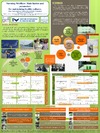Please use this identifier to cite or link to this item:
https://accedacris.ulpgc.es/jspui/handle/10553/11839
| Title: | Farming Nitrifiers: Main factors and parameters for maintaining healthy cultures | Authors: | Tames-Espinosa, Mayte Bru, Eduardo O'Shanahan Roca, Leopoldo Gómez, May Packard, Theodore Train |
UNESCO Clasification: | 251001 Oceanografía biológica | Keywords: | Nitrification Nitrifiers Bacterial culture Climate change |
Issue Date: | 2014 | Abstract: | The atmospheric CO2 level is rising. Its greenhouse effect is partially mitigated by terrestrial (plants) and marine photosynthetic organisms (algae, phytoplankton), and also by the less-known chemosynthetic bacteria. Within this group of bacteria, nitrifiers have a direct and indirect impact on carbon fixation because, on one hand, they are autotrophs and, on the other, they release inorganic nitrogenous nutrients that feed other photoautotrophs. A new assay which simplifies the measurement of nitrification would improve our knowledge about the ocean’s capacity to fix CO2. Knowing how to cultivate these microbes from marine water samples is a first step towards developing new nitrification detection techniques. During the last six months, we have isolated and cultured a natural assembledge of marine nitrifiers. Our larger objective is to develop a way to enzymatically detect nitrification. However, to do this, we need large quantities of nitrifiers. Consequently, at this point, culturing this marine nitrifier community is our priority. We have learned that pH, nutrient levels, air flow, temperature, low light and sterility are critical for growing healthy nitrifiers. With this knowledge we will now be able to conduct experiments with the nitrifiers and develop the methodology that we seek. | URI: | https://accedacris.ulpgc.es/handle/10553/11839 | Source: | IV Congreso de Ciencias del Mar |
| Appears in Collections: | Póster de congreso |
Page view(s)
28
checked on Jan 10, 2026
Download(s)
9
checked on Jan 10, 2026
Google ScholarTM
Check
Share
Export metadata
This item is licensed under a Creative Commons License

